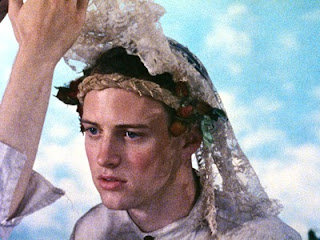It seems appropriate for three new DVDs exploring mash-ups of the hetero and homo/bi/trans worlds at the beginning of GLBT Pride season. First out of the gate is Breaking Glass Pictures'
Straight & Butch
, which was just released today. This intriguing documentary follows the multi-year odyssey undertaken by
Butch Cordora, an openly gay Philadelphia TV host, to create a calendar in which he and an assortment of straight men would pose together nude. In re-creating iconic images including Janet Jackson's hands-on-breasts
Rolling Stone cover, a nude John Lennon embracing Yoko Ono, and The Beatles'
Abbey Road album cover sans clothing, Cordora hoped to find common ground between gay and straight men in the most intimate of photographic situations.
While a few of the subjects were personal friends or co-workers of Cordora's before shooting and a couple are professional models, most are regular guys from the Philadelphia area. The film notes that 59 exclusively straight men in all were asked to participate, but 48 said "no" and refused to state their reasons for doing so on camera. A few wrote that their wife or girlfriend would be uncomfortable with them posing nude, at least with another man.
Those models who agreed include the husband of one of the photographers, a Whole Foods grocery store bag boy, a pizzeria owner, a professional wrestler, and a heavily-tattooed artist. There is also a nice ethnic mix among them, including two Black men, a Latino originally from Colombia, and an Asian. The men's initial comfort levels vary, as do their body types, but all save one come away from the experience of being photographed nude with Cordora feeling good about it. As one model remarks, "(The project) says something about our country or, more importantly, where our country could and should be" in terms of gay-straight relations. While
Straight & Butch gets a little long and repetitive by the final shooting session, it is well worth watching.
Meanwhile, a lesbian-themed movie out May 3 on Wolfe Video,
Bloomington
, is generally worth avoiding. The plot initially focuses on the adjustment to college life in the titular Midwest city of a previously home-schooled young woman who also happens to be the former star of a cult science-fiction TV series à la
Star Trek (to really drive the comparison home, the character's name is Jackie Kirk). Jackie, played by the Miley Cyrus-esque Sarah Stouffer, has good intentions of leaving showbiz behind and studying law. Things start to change, however, once she crosses paths with Abnormal Psychology professor Catherine Stark (the beautiful Allison McAtee).
Stark's reputation as a "vampire lesbo" (in the unflattering words of one student) who sleeps with her students precedes her. It isn't long before Stark confirms she is lesbian and begins an affair with Jackie. It also isn't long before Hollywood starts beckoning Jackie back for a movie version of her TV show. Fearful Catherine starts drinking and inexplicably sleeping with a man, while Jackie apparently realizes she needs to "straighten up" and have sex with a male fellow student if she is to have a chance at headlining a blockbuster movie.
Bloomington, written and directed by Fernanda Cardoso, starts promisingly but is ultimately compromised by its characters' shifting allegiances and alliances. Too much of the film is hard to swallow, from the casual way it treats an ethically-questionable sexual relationship between student and teacher to its perfunctory ending. Like Jackie, Cardoso may need to get back to basics academically.
The best by far of these new DVD releases is
Casper Andreas' hilarious
Violet Tendencies
, out May 24 from Breaking Glass Pictures. Mindy Cohn, lovingly remembered by many of us as the irrepressible Natalie on the 1980's series
The Facts of Life, stars as "the last fag hag" in Manhattan. Violet is adored by her large circle of gay friends and spends virtually all her free time with them. This makes it difficult for her to find romance with a "fag stag" or other straight man, for which she desperately longs, despite late nights on the "Frisky Friends" phone chat line and resultant, aborted dates.
As much as she hates to do so, Violet cuts herself off from her boys once she meets Vern, an ex-Mormon architect from Idaho who reminded me a lot of Geoffrey Rush in
Shine. But the boys will have none of it, devoted to Violet's happiness as they are, and begin to seek a more ideal partner for her... who may unknowingly be right in their midst.
Violet Tendencies kept getting away from me when it played last year's GLBT film festival circuit, and I'm so glad I finally saw it. The film is chock full of relatable, well-drawn characters, razor-sharp dialogue and witty observations (the screenplay was written by
Jesse Archer, Andreas's frequent collaborator), and fabulous New York locations. Cohn's performance and those of the supporting cast are great, and there are cameos by such NYC gay icons as
Hedda Lettuce,
Michael Musto and
Randy Jones, a.k.a. the Village People's Cowboy.
To quote Violet's dating advice-dispensing, food-deprived fashion model co-worker, Salome: "Get off your racket" and see
Violet Tendencies ASAP!
Reverend's Ratings:
Straight & Butch: B
Bloomington: C-
Violet Tendencies: A-
Review by Rev. Chris Carpenter, resident film critic of Movie Dearest and the Blade California.
































